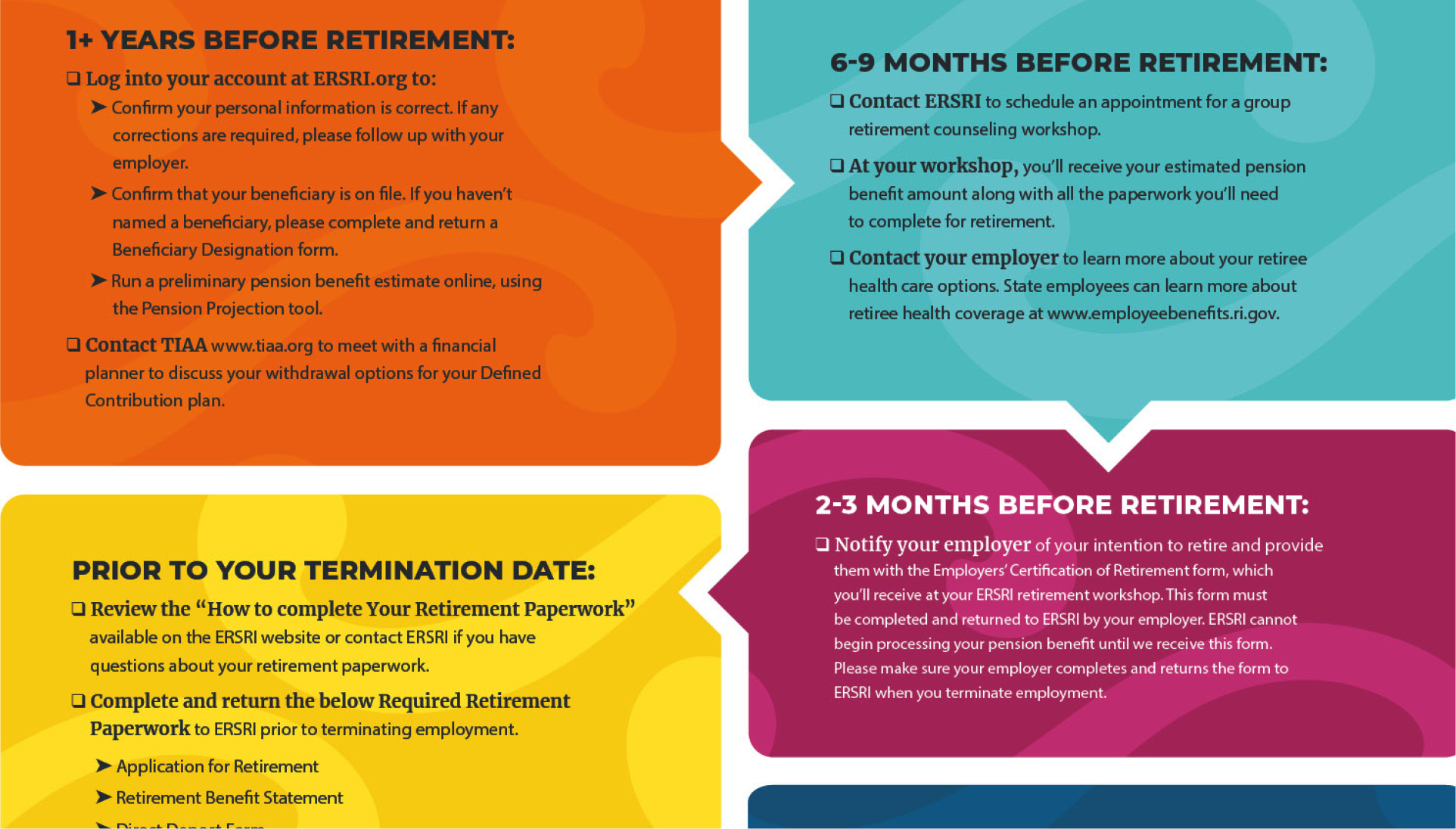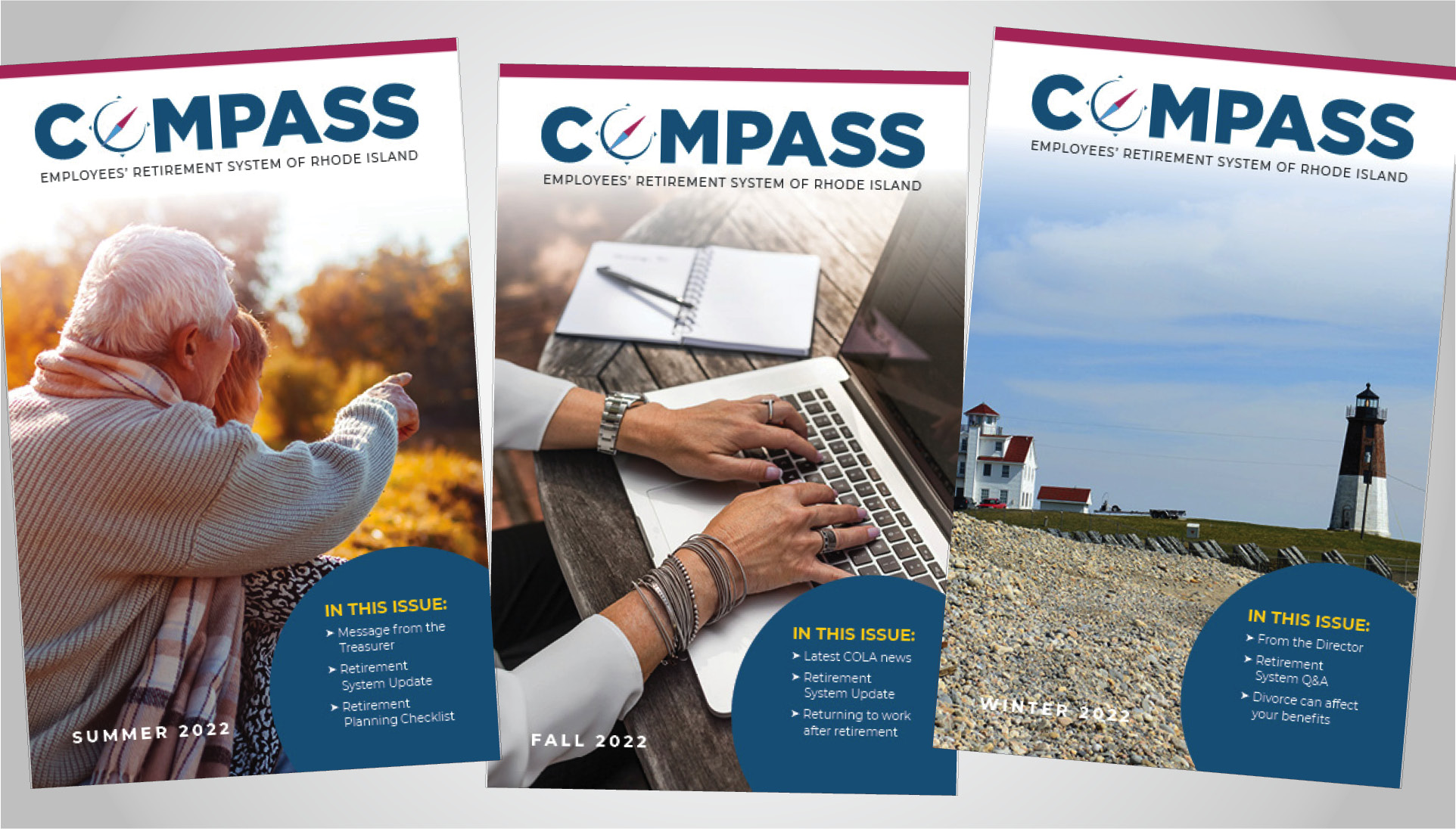Divorce
Your retirement benefit may be considered a marital asset in a divorce proceeding, and the ex-spouse of the member may be entitled to a portion of their retirement benefit. Learn more about the impact a divorce may have on your retirement benefit.
Change or designate beneficiaries
Beneficiaries are individuals designated by an ERSRI member to receive survivor and/or death benefits after his or her death. It is important for members to keep their account updated, including beneficiary information. To designate or update your beneficiary, use the link below.
Update your address
Whether you are active, deferred or retired, having your correct address, phone number and email address is very important to us so we can keep in contact with you. Use the link below to learn more about updating your address with ERSRI.
Leaving Employment Prior to Retirement Eligibility?
If you leave your job and terminate employment with a participating employer but are vested in the system (currently 5 years of contributing service), you may begin collecting your pension benefit when you meet your retirement eligibility criteria — as long as you do not withdraw your contributions.
In some cases, your eligibility date may be adjusted if you leave employment prior to reaching your full retirement date. However, your benefit will be the same as it was the day you terminated employment. There are options to receive your benefit prior to reaching your full eligibility date but those options require a reduction of your benefit (see the discussion of Transition Rules in the sections above).
It is important to know that once you leave active employment, ERSRI will not automatically begin sending your pension benefit when you reach you full retirement eligibility date. It is your responsibility to notify ERSRI when you become eligible and to fill out a retirement application approximately three to six months before your eligible retirement date.
If you are not vested in the system (less than 5 years of contributing service) you can take a refund of your pension contributions without interest. You can roll this money over into a qualified retirement account or take the refund as cash. You should be aware that if you take a refund of your contributions as cash you will be subject to mandatory tax withholding and may incur additional tax penalties for early withdrawal. Always consult a tax professional when considering this option.
Other Early Retirement Options (“Transition Rules”)
State employees, teachers, and municipal employees who were not eligible to retire as of June 30, 2012 have the option of retiring under a transition rule if they meet all the applicable criteria. If you are considering retiring under one of the transition rules, we strongly encourage you to contact ERSRI and speak to a Retirement Counselor to verify your eligibility for early retirement before terminating your employment.
-
Transition Rule 1: If you have 20 or more years of service and are within 5 years of eligibility from your full benefit retirement date, or 5 years from your full retirement age, you may retire early with a permanent reduction in your benefit amount. Note: For Correctional Officers and BHDDH nurses Transition Rule 1 would only be applicable in cases where they are retiring under state employee retirement eligibility rules.
Early Retirement Reduction Year(s) from full retirement Percent Reduction Cumulative Reduction 1 9% 9% 2 8% 17% 3 7% 24% 4 7% 31% 5 7% 38% -
Transition Rule 2: If you earned at least 10 years of contributory service as of June 30, 2012, this rule provides you an additional option for an earlier retirement date. This rule does not allow you to retire earlier than the eligibility date determined under the laws in effect on June 30, 2012. An employee who elects this option will receive a Defined Benefit Plan benefit which is calculated using their service credit and highest average compensation as of June 30, 2012. If you elect this option, you will not receive retirement credit for any service and compensation earned after July 1, 2012.
-
Transition Rule 3 (Police and Fire MERS only): If you earned at least 10 years of contributory service as of June 30, 2012 AND you were age 45 prior to 7/1/2012 AND you would have been eligible to retire at or prior to age 52 in accordance with the rules in effect prior to 7/1/2012, this rule provides you an additional option for an earlier retirement date without a benefit reduction. If you meet the criteria, you are eligible to retire at age 52.
We’re here for you

If you have additional questions, ERSRI Customer Service Representatives are available Monday - Friday, from 8:30 a.m. to 4:00 p.m. at (401) 462-7600. You can also contact ERSRI by e-mail through the form on our Contact Us page.
Answers for your questions

We’ve gathered a list of the most common questions we hear from our members and answered them on the Member FAQs page.
Preparing to retire?

If you are planning to retire in the next 12 months, you may want to visit our Planning for Retirement page. There you’ll find a helpful planning checklist and access to information about determining your benefits and eligibility.
Get the current news and publications

The Compass is mailed to ERSRI members quarterly, but you can review both current and past issues along with many other ERSRI publications in our Publications and Reports section.
How is the plan managed?

The Employees’ Retirement System of Rhode Island is overseen by a 15-member Retirement Board chosen in accordance with Title 36 of the Rhode Island General Laws. The Board approves disability pensions, votes on the target investment rate of return and other assumptions and certifies employer contribution rates.